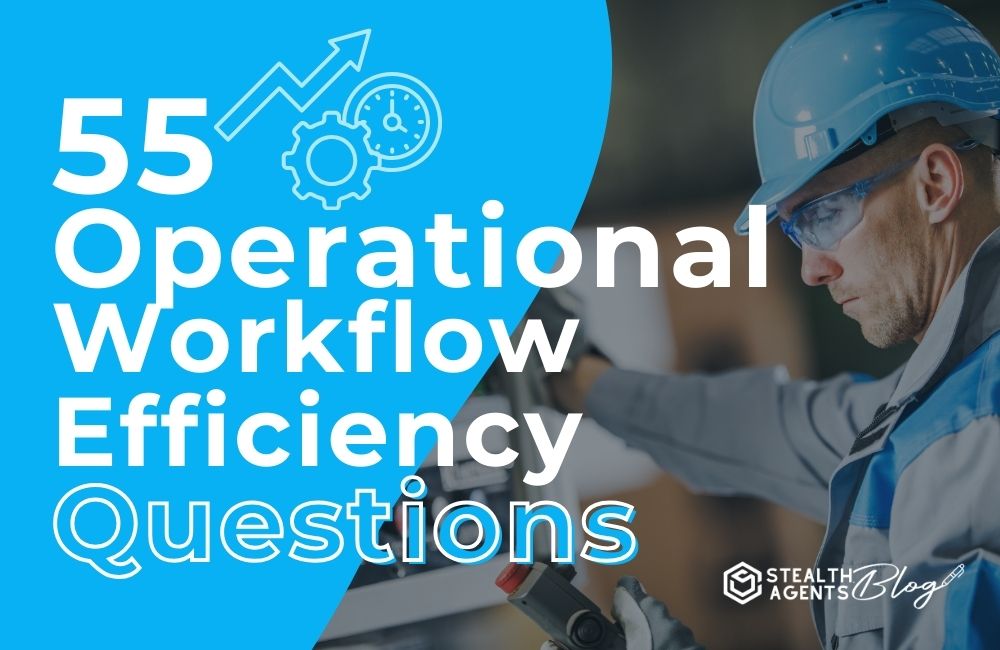55 Operational Workflow Efficiency Questions
Running an efficient operation isn’t just about doing things right; it’s about continually fine-tuning your approach so that everything runs like a well-oiled machine. Ensuring your business operates at its peak involves a steady interrogation of your workflows, so they remain productive, consistent, and agile.
To lead you on the path to operational excellence, here are 55 nitty-gritty questions to ask yourself and your team. Think of this “Operational Workflow Efficiency Check” as a self-audit to identify areas in your business that could benefit from improvement. Ready to dig deep into the workings of your enterprise? Let’s get started.
Introduction: The State of Operational Workflow Efficiency
Before diving into the questions, it is imperative to understand why operational workflow is such a vital component of a successful business. High operational efficiency leads to less waste, lower costs, and increased customer satisfaction. It assures that your company can deliver its products and services in a consistent and timely manner, which is crucial for any business seeking to thrive in a competitive marketplace.
Your workflows, the sequences of steps you follow to complete a task, demand regular attention to keep them aligned with your business objectives. These questions are designed to assist you in identifying areas for improvement and innovating your processes, to ultimately ensure your workflow is a competitive advantage rather than a handicap.
The List: 55 Operational Workflow Efficiency Questions
Let’s dive into the checklist. Remember, the goal isn’t just to answer these questions, but to delve into the why behind your current workflow and how it could evolve.
1. Are There Bottlenecks in Your Workflow?
Identify any bottlenecks or points at which progress is significantly slowed. What can be done to alleviate these issues?
2. Do Your Team Members Have Clear Roles and Responsibilities?
Ambiguity breeds inefficiency. Are your team members crystal clear on what’s expected of them and how their roles fit into the bigger picture?
3. Have You Documented All Your Workflows?
Documentation not only standardizes processes but also makes them more transparent and easier to review. Is every operational workflow recorded somewhere accessible?
4. Are You Using the Right Tools and Technology?
Outdated tools can hold you back. How equipped are you with the latest software, hardware, and other resources needed to streamline operations?
5. How Long Does It Take to Complete Routine Tasks?
Timeliness is key. Assess the average duration of common tasks from start to finish. Can these times be improved?
6. Are You Leveraging Automation Where It’s Feasible?
Automation reduces human error and speeds up processes. Can routine tasks be automated to free up your team’s time for higher-value activities?
7. Are There Unnecessary Steps in Your Processes?
Every redundant step is a drain on resources. Identify and eliminate any unnecessary processes.
8. How Secure Are Your Operational Workflows?
Ensure your workflows are resilient against cyber threats and data breaches. What steps have you taken to bolster security?
9. Have You Established Clear Communication Channels?
Effective communication is essential. Are there clear pathways for team members to collaborate and share information without confusion or delay?
10. Do You Regularly Review Your Workflows for Optimization?
Stagnation is the enemy of efficiency. How often do you review and adjust your workflows in response to changing business needs?
11. Are You Monitoring Your Systems for Performance Trends?
Understanding trends can help you predict and prepare for changes. What systems are in place to track performance over time?
12. Are Your Work Orders Organized and Accessible?
Disorganized work orders lead to confusion and delays. How are your work orders structured and stored?
13. Is There a Standard Operating Procedure for Every Task?
Consistency is key to workflow optimization. Do you have a standard operating procedure for all tasks, and is it being followed?
14. How Are Workflows Aligned With Business Goals?
Your workflows should serve a strategic purpose. Are your processes aligned with overarching business objectives?
15. Does Every Workflow Have an Owner?
Accountability helps maintain performance. Are there clear owners for each workflow, responsible for its execution and improvement?
16. Are You Engaging with Frontline Employees for Workflow Insights?
Those on the front lines often have the best insights. How are you regularly gathering feedback from employees on operational workflows?
17. Can Your Workflows Adapt to Changing Market Conditions?
Flexibility is key in a dynamic market. How easily can your workflows be adjusted to accommodate change?
18. Is Your Workflow Approval Process Efficient?
A cumbersome approval process can stagnate your workflow. Is your process as streamlined as it could be?
19. Are You Capturing and Analyzing Data on Your Workflows?
Data analysis can reveal surprising insights. How are you capturing and analyzing data related to your workflows?
20. Are You Setting and Meeting Workflow Performance Metrics?
“What gets measured gets managed.” Do you have clear performance metrics for your workflows, and are you hitting your targets?
21. Are You Encouraging and Implementing Employee Suggestions for Workflow Improvement?
Employee input is invaluable. How are you encouraging and implementing staff suggestions for better workflows?
22. How Do External Factors Affect Your Operational Workflows?
External factors can’t be ignored. How do changes in your industry, the economy, or regulatory environment impact your workflows?
23. Can You Identify Downtime in Your Workflows?
Downtime is a silent killer of productivity. Can you identify moments of downtime, and are there strategies to minimize them?
24. Are Your Workflows Sustainable in the Long Term?
Shortcuts can lead to burnout and system failures. Are your workflows designed for sustainable long-term use?
25. Are You Using Checklists and Templates Where Applicable?
Checklists and templates can remove ambiguity and speed up tasks. Are they used effectively in your workflows?
26. How Would You Rate the Overall Clarity of Your Workflows?
Clear workflows make for efficient operations. On a scale of 1-10, how clear are your current workflows to your team?
27. Are You Keeping Workflows Simple Where Complexity Isn’t Necessary?
Complexity can often be a disguise for inefficiency. How are you simplifying your workflows without compromising their effectiveness?
28. How Do You Factor in Change Management with New Workflows?
Change can be disruptive. How do you manage the human side of change when implementing new workflows?
29. Are You Balancing Process Control with Employee Empowerment?
Control can’t come at the expense of employee empowerment. How are you striking the right balance?
30. Are You Using Lean or Agile Principles to Optimize Workflows?
The right methodology can make a big difference. How are you applying lean or agile principles to optimize your workflows?
31. Are Workflow Expectations Overwhelming for Any Team Members?
Overload leads to burnout. How can you adjust workload expectations to ensure team members aren’t overwhelmed?
32. Have You Established Clear Finish Lines for Each Workflow?
Clarity on the end goal helps drive performance. Are there clear finish lines for every task and workflow?
33. Are You Encouraging a Culture of Continuous Improvement?
A culture that values improvement ensures that workflow efficiency is a continuous focus. How are you fostering this within your organization?
34. Do You Have a System of Cross-Training for Workflow Resilience?
What happens when a key team member is out? How are you ensuring the resilience of your workflows through cross-training?
35. Are Routine Checkups Built Into the Workflow to Maintain Efficiency?
Prevention is better than cure. What are your strategies for regular workflow checkups to catch and address issues early?
36. Are You Conducting Regular Workflow Health Checks?
How often do you conduct in-depth health checks of your workflows to ensure they’re functioning optimally?
37. How Does Your Workflow Support Customer Satisfaction?
The end user should always be in mind. How does your workflow directly support a positive customer experience?
38. Are You Providing the Right Training for Efficiently Executing Workflows?
Proficiency is essential. Is the necessary training provided to ensure team members can execute workflows efficiently?
39. Do You Keep Historical Records of Workflow Performance?
Past performance can be a great teacher. Are historical records of workflow performance maintained and reviewed?
40. Are You Encouraging a Mindset of Personal Responsibility for Workflow Efficiency?
Team members should feel personally responsible for workflow efficiency. What are you doing to encourage this mindset?
41. What Is Your Reaction Time to Workflow Inefficiencies?
Inefficiencies can’t linger. What is your typical reaction time to address workflows that aren’t performing up to par?
42. Are You Fostering a Team Environment That Supports Efficient Workflows?
A supportive team environment is crucial. How are you fostering an environment that supports efficient workflow execution?
43. Are Your Workflows Aligned Across Different Departments?
Siloed workflows can lead to inefficiencies. How are you ensuring alignment across different departments?
44. Are You Sharing Best Practices Among Teams to Improve Workflows?
Knowledge sharing is power. How are best practices from one team being shared to improve workflows across the organization?
45. Do You Solicit Customer Feedback on Workflow Efficiency?
The customer perspective is invaluable. Do you routinely ask for feedback on how efficient your workflows are in their eyes?
46. Are You Maintaining Transparent and Honest Communication About Workflow Challenges?
Not all workflows will be perfect. Are you maintaining transparent communication about challenges and the path to resolution?
47. How Often Do You Conduct Full Workflow Reviews?
Full reviews provide a comprehensive view. How often do you conduct detailed reviews of your workflows?
48. Are You Documenting and Sharing Workflow Changes for Accountability?
Transparency is key. Are you properly documenting and sharing workflow changes to keep everyone accountable and informed?
49. Are You Considering the Environmental Impact of Your Workflows?
Sustainability is a growing concern. Are you taking steps to minimize the environmental impact of your workflows?
50. What Methods Are You Using to Ensure Consistency Among a Growing Team?
Consistency can be a challenge with growth. What methods are you using to ensure new team members align with your existing workflows?
51. How Does Workflow Efficiency Affect Your Competitive Advantage?
Operational excellence provides a competitive edge. How does your workflow efficiency bolster your competitive advantage?
52. Are Your Workflows Customer-Centric?
Your business exists to serve customers. Are your workflows designed with customers at the core?
53. How Do You Handle Exceptions in Your Workflows?
Not all cases will fit neatly into your workflow. How do you handle exceptions without causing a complete breakdown?
54. Do Your Workflows Promote Innovation and Creativity?
Routine tasks don’t have to be mundane. Are your workflows designed to promote innovation and creativity?
55. How Transparent Are You About the State of Your Operational Efficiency?
Honesty is the best policy. How transparent are you with stakeholders about the state of your operational efficiency and ongoing efforts to improve?
Conclusion: Embracing Efficiency
By addressing these 55 questions, you’re not only gaining a bird’s-eye perspective of your operational workflow but also setting the stage for a culture of continuous improvement within your organization. Workflow efficiency isn’t about reaching a destination; it’s a journey of refinement and adaptability.
Remember, the goal is not to have a perfect workflow, but to have a system in place that can continuously self-correct and evolve. Celebrate the areas where your business excels and use these questions to zero in on the essential areas for growth and enhancement.
In the end, the most successful businesses don’t shy away from analyzing their operations. They embrace these questions and the insights that can be gained, knowing that every small tweak leads to more significant progress. Now it’s your turn to put these questions into action and transform your operational efficiency to new heights.












